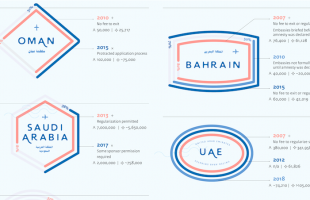On Sunday October 7, the Lebanese army violently attacked 72 migrants at two residences in the Ashrafieh district, claiming the migrants aggressively resisted attempts to check their papers. The abuses occurred in the vicinity of several witnesses, who along with 25 of the assaulted migrants, contributed to HRW's report. The men maintain that the soldiers "viscously kick[ed] and beat them" prior to attempts to verify their identities. The dissemination of witnesses accounts and explicit images of those abused quickly garnered international condemnation of the attack.
The Army Command quickly retaliated against HRW's criticism. The Army insisted it was within its rights to physically violate migrant workers, legitimizing their gruesome behavior on the basis of unconfirmed allegations of crime and harassment from nearby residents. HRW's interviews challenge the veracity of these justifications:
Lebanese neighbors of the migrants confirmed their accounts of the army assaults and said that they had not had any problems with the workers, some of whom have lived in Beirut’s Geitawi neighborhood for years.
Furthermore, residence of the Ashrafieh district released a statement condemning the army's attacks.
Accepting the truth of these these generalized claims, which prejudicially implicated all migrant workers, does not absolve the army of it's wrongful conduct. No evidence of efforts to ascertain the identity of the migrant workers at fault has been put forth. Had the army accurately determined the criminals in question, the migrants should have been charged with a crime, rather than brutally assaulted. That no migrants were formally arrested highlights the ill-founded defense of the army's violence. This wholesale exclusion of foreign laborers from Lebanon’s justice system reflects the illusory nature of worker rights. The minimal codifications meant to protect migrants workers prove transient and flimsy when the state itself can abuse workers with impunity.
The Army Command also alleges that HRW overstated the conduct of its security officials. Some commentators agreed that Lebanon is the "victim" of the international NGOs "suspicious" intentions:
The Army Command called on human rights organizations and media outlets “to fully verify the facts and contact the Army Command in order to clarify any vague details, instead of inflaming the public opinion, and to address the misdeeds that some residential areas are witnessing.”
Yet, several citizen accounts of the beatings, some in the form of live-tweets, reinforce HRW's heavily documented report.
Additionally, the Army Command argues the military's actions were merely reactions to the workers "resistance" and "violence confrontation." Even if these assertions proved true, multiple accounts of the army’s behavior indicate an extreme disproportionate use of force.
The Army Command also deflected responsibility for subsuming innocent workers, explicitly sanctioning the discriminatory nature of these attacks. According to the army’s logic, the individual actions of some migrant workers justifies retaliation against any migrant worker. The rights of migrants, innocent bystanders not withstanding, are unapologetically subordinated to those of Lebanese citizens:
It also regretted “any security act that might target some innocent workers,” but stressed that it rejects any insults against the military institution “under the excuse of the rights of migrant workers, whose rights must not come at the expense of Lebanese men and women targeted by harassment.”
Lebanon's official response to the situation contradicts recent publicity campaigns aimed at whitewashing the chronic mistreatment of migrant workers. Lebanon's attempts to combat its deteriorating international image include several public commitments to expanding the rights of foreign laborers; for example, the proposed abolition of the sponsorship system earlier this year is repeatedly acclaimed as evidence of Lebanon's dedication to migrant rights. Migrant-receiving nations often boast improvements to migrant conditions prior to their actualization and with little intent of their actual realization in order to appease an increasingly critical international climate. In keeping with this penchant for lip-service, Lebanon's unequivocal support for the army’s conduct reflects the purely cosmetic nature of its pledge to institute reform.
The Army's brazen disregard for the basic rights of migrants evidences the inequitable status of Lebanon’s foreign labor force. The October 7 raid is not an isolated incident; just one week prior, the army launched another assault on migrants in the same area. The army’s refusal to investigate into the soldier’s conduct, and the puerile countercharges against HRW, demonstrates the state's own contravention of the rights it claims to institutionalize. Migrant Rights urges Lebanese officials to condemn these attacks and to hold those involved responsible.




